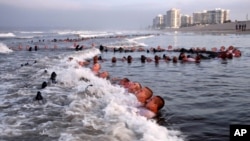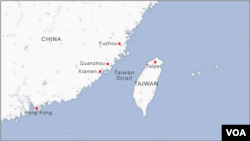The United States Navy's elite SEAL Team Six would likely have a limited role in defending Taiwan should China invade the self-governing and democratic island, say analysts responding to a Financial Times report that the unit has been training for it for more than one year.
Lyle J. Morris, senior fellow for foreign policy and national security at the Asia Society Policy Institute’s Center for China Analysis, tells VOA's Mandarin Service that if the unit is indeed preparing for an attack by Beijing, it may indicate that the U.S. is more deeply involved in defending Taiwan than previously thought.
However, he stressed that the secret and precise combat characteristics of SEAL Team Six mean its role in resisting China's invasion of Taiwan would be very limited and the focus would be on carrying out special tasks.
"As far as their sheer capability to repel an invasion. I think that's more limited," he says. "I think it's in a very discreet, narrow way of coming in for a specific task that Taiwan might need, whether it's helping to protect, let's say, an airfield in Taiwan or protect a communication asset in Taiwan, in Taipei, they could come in and out very discreetly and very lethally to protect that asset."
SEAL Team Six specializes in performing sensitive, highly difficult missions. In 2009, the unit rescued Richard Phillips, captain of the MV Maersk Alabama, who was taken hostage by Somali pirates.
The elite unit gained an international reputation after the successful raid on al-Qaida leader Osama bin Laden’s compound in Pakistan in 2011.
It is one of the most highly regarded U.S. military units, along with the United States Army's Delta Force, the 75th Ranger Regiment's Regimental Reconnaissance Company, the Intelligence Support Activity, and the Air Force's 24th Special Tactics Squadron, and part of the Joint Special Operations Command.
"Navy SEALs usually deployed from submarines or, most likely, small ships and are useful for targeting vulnerabilities in enemies’ presentation," Richard D. Fisher Jr., senior fellow with the International Assessment and Strategy Center, tells VOA.
Analysts say the U.S. military likely revealed the SEAL Team Six training program to the Financial Times to send a warning to Beijing amid China’s increasingly assertive moves in the region.
"This is one way the U.S. is bolstering deterrence towards China, towards preventing a Chinese invasion of Taiwan," says Morris. "So, I think this is just an added factor getting China to second guess or to reconsider what it will face if it were to invade Taiwan."
Dennis Wilder, a senior fellow for the Initiative for U.S.-China Dialogue on Global Issues at Georgetown University and a former Central Intelligence Agency military analyst, posted on social media platform X, "It is sure to get under Beijing's skin."
In a written response to VOA's Mandarin Service, Liu Pengyu, the spokesperson of the Chinese Embassy in Washington, said, "The Taiwan question is the very core of China’s core interests and the first red line that must not be crossed in the China-U.S. relationship."
He urged "the U.S. to earnestly abide by the one-China principle and the three China-U.S. joint communiques, stop enhancing military contact with the Taiwan region or arming it by any means or under whatever pretext, stop creating factors that could heighten tensions in the Taiwan Strait, and stop conniving at and supporting the separatists’ attempt to seek 'Taiwan independence’ by force."
Taiwan split from China during the civil war that saw the Communist Party seize power in Beijing in 1949 and the Nationalist Party flee to the island, which developed into a flourishing democracy. But China’s one-party, authoritarian state never gave up its claim to Taiwan and considers it a renegade province that must one day reunite with the mainland, by force if necessary.
Admiral Philips Davidson, former commander of the U.S. Indo-Pacific Command, warned in 2021 that China could attack Taiwan within six years. President Joe Biden has repeatedly stressed that if China invades Taiwan, the U.S. will intervene militarily to defend it.
The U.S. Department of Defense declined to confirm or deny the Financial Times report. Pentagon spokesperson John Supple said in an email to VOA, "The DoD and our service members prepare and train for a wide range of contingencies. We will not comment on specifics, but will restate that we are committed to our longstanding one China policy, guided by the Taiwan Relations Act, the Three Joint Communiques, and the Six Assurances. As we have said before, conflict is neither imminent nor inevitable."
America’s one-China policy is a strategically ambiguous agreement it made in 1972 to establish relations with China that recognizes Beijing as the only government of China and acknowledges, but does not endorse, Beijing’s claim that Taiwan is part of China.
Washington has unofficial relations with Taiwan defined through the Taiwan Relations Act, the Three Joint Communiques with Beijing, and the Six Assurances with Taipei, which underscore U.S. opposition to attempts to unilaterally alter the status quo and determination to help Taiwan defend itself through weapons sales.
There has been previous U.S. military training for Taiwan’s defense, both on the island and in the United States. Reuters reported last year the U.S. was set to expand the number of troops helping train Taiwanese forces on the island, and Taiwanese officials confirmed more of their troops would be training in the U.S.





